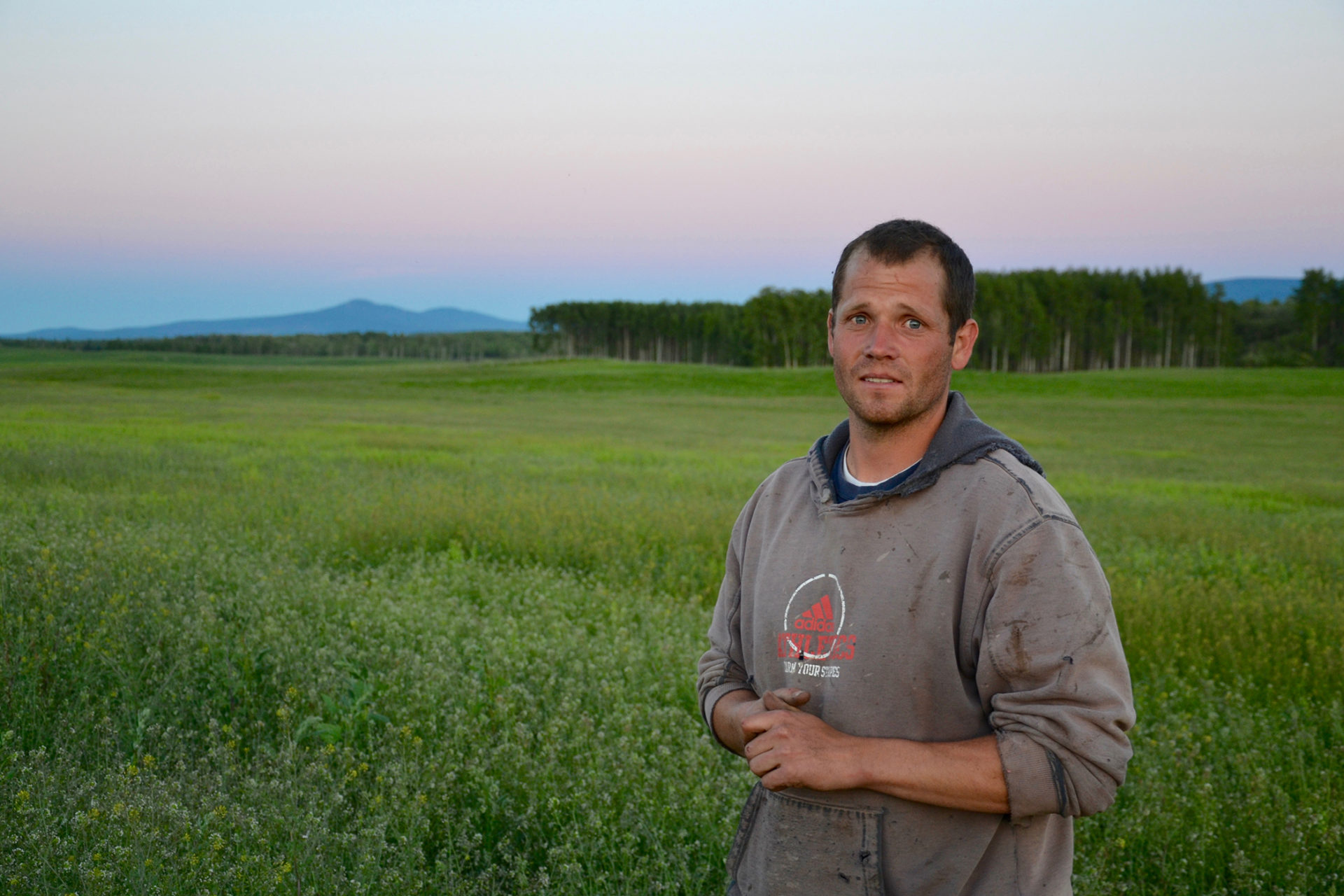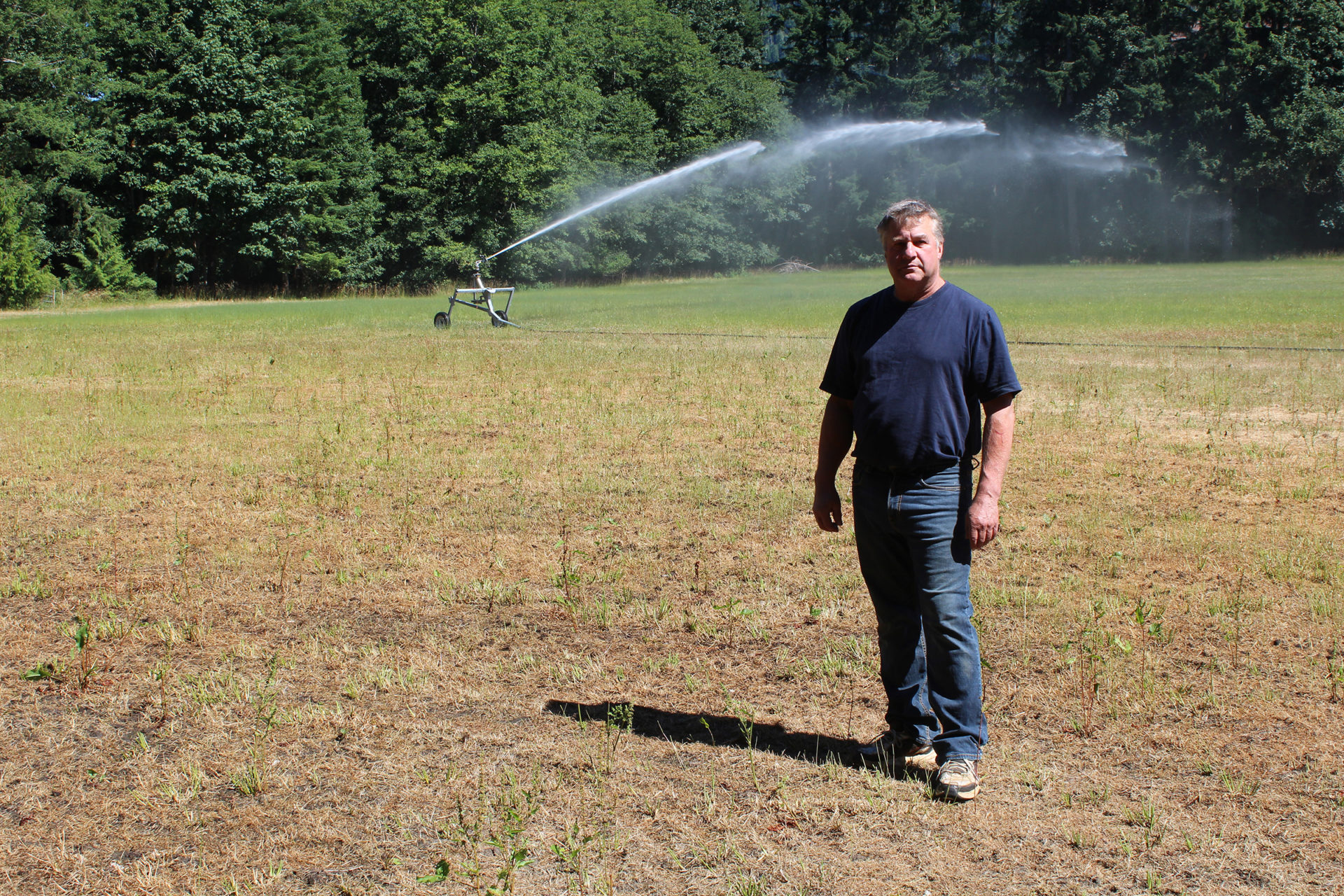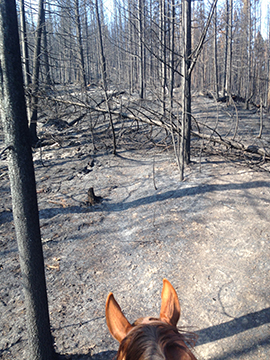VANDERHOOF – A wet fall and a lack of snow cover has resulted in winterkill of more than 20,000 acres of alfalfa in the Nechako Valley.
The issue became apparent to forage growers this spring when the alfalfa simply failed to appear. Acreage that the year prior had produced three to four tonnes per acre of export-quality alfalfa came up weeds.
“So as much as the conditions were really wet last year, the fields were abundant and everybody was excited about even the new seedings,” says Denise Dowswell of Little Valley Farms near Vanderhoof. “It looked like it was really well established and we would be in good shape this year, but where it should have been producing, it was just dead and we had to spray it out.”
Dowswell farms cattle and forage with her father, Ken Fawcett. They run about 500 cow-calf pairs, putting up feed for their livestock and growing alfalfa for export. This year they’ve lost just over 1,800 acres of alfalfa. What wasn’t killed completely came in patchy and full of weeds.
“When the hay plants came in, it was another way of diversifying so we put a lot of expense into going into the alfalfa export market,” she says, referring to two hay compression plants built in the last five years that export to China.
“It felt like it was possible to get land back into production. We’ve been adding about 500 acres per year into rotation and getting things back into shape. We survived through the BSE crisis in 2003 but 14 years later, it’s pretty devastating to be hit this hard,” adds Dowswell.
Little Valley Farms is not alone. At least 70 farm families have been affected by the winterkill in an area that stretches from Vanderhoof to Fraser Lake. Most farms had already incurred costs fertilizing the fields before they realized the crop wasn’t coming.
“This year we had just over 1,100 acres of alfalfa that was wiped out,” says Brian Kochel, who farms with his family near Fort Fraser. “The alfalfa fields are just stink weed and dandelions. We were going to pasture it but we’re just going to spray it. We had planned to seed another 340-acre field, but we just ran out of money.”
Difficult future
Without money to reseed, growers are facing a difficult future. Many have already sold cattle, equipment and even land to keep the bills paid over the summer. With lines of credit tapped out and very little crop expected, people are bracing themselves for the fall.
“This impacts everyone, not just the farmers. It’s the John Deere dealer, it’s P&H Supplies, it’s the grocery store,” says Brian Kochel. “I know one family, it’s three boys and the mom and dad, and one of them has to leave this fall. Is that going to happen to us? I don’t know – maybe I need to take off next year and get a job somewhere else.”
It’s a strong statement coming from a young man who left the University of Alberta, where he was working on a Master’s thesis on hay export, to help start Nechako Valley Agri Ltd., one of the area’s two hay processors that have bought thousands of acres in recent years to meet export demand.
TopHay Agri-Industries Inc., the other processor, lost 3,000 acres to winter kill this year. Judd Wu, CEO, said this leaves TopHay struggling to supply its Chinese contracts.
“Last year, we shipped bout 20,000 tonnes. This year at best we might be able to get 6,000 tonnes,” says Wu. “We will try to keep on going but it’s very unfortunate. We might have to buy alfalfa from Alberta or the US, but that’s not very good for our local economics.”
Brian’s father, John Kochel, is president of the Nechako Valley Cattlemen’s Association. He has been leading a local effort to request disaster relief support from the provincial government.
“I told them you’re not going to have an existing program to cover this. This is a once in a lifetime situation; the Nechako Valley has never reached out for help. You need to look at this as disaster relief,” Kochel explains. “They said no one is dying. I told them, ‘they are dying financially.’ There are funds for a situation like this.”
“I went to our MP in Ottawa and he got the federal minister of agriculture to call the BC government and ask what’s going on. They say we hit the parameters of the [federal] AgriRecovery program with no problem but the provincial deputy minister wouldn’t even send it to the federal government. It just died on the table; there’s no sense to it,” Koch explains.
Province silent
Country Life in BC’s request for interview with provincial business risk management staff was refused. The BC Ministry of Agriculture acknowledged the crop failure in a statement but simply provided information on existing risk management programs.
It’s the same response John Kochel received after working with provincial staff for two months to draft a request for emergency funding. The package requested $205 per acre, an amount equivalent to a fraction of lost revenues and reseeding costs. The flat-out rejection from the deputy minister came like a slap in the face.
“The existing programs are a disaster. We have producers on crop insurance and they’ve done nothing for them – they’ve been nothing but hassled right through this thing,” says Kochel, his frustration palpable. “The ministry people have been here three times looking at fields. There’s no live alfalfa in this area. How can you have fields that are not counted? But their attitude is that you better be grateful you’ve got what you’ve got.”
Little Valley Farms has participated in crop insurance programs since the 1980s. Despite having coverage, they are struggling to get fair compensation for what they have lost. Fields are being excluded, and they have been told to harvest small patches, and to bale the quackgrass and weeds.
“It’s already a crisis and you’re already working with the bank to try and deal with these things, then you’re also having to fight the production insurance people,” says Denise Dowswell. “We were offered our premiums back on a couple of fields, which is almost like getting in a car wreck with ICBC and them saying, ‘Rather than us replace your car would you like your premium back?’”
Choosing to stay the course, Dowswell has battled a plodding process that has prevented them from being able to even seek additional credit to replant this year. Alfalfa is expensive to seed, but the cost is usually spread out over five to seven years. Most fields don’t get a substantial yield until their second season. The delay makes the impact of the losses more dramatic for the region.
Frustration
“Part of the frustration on producers’ part, and why we were asking in early May to have it called a disaster area, is because if farmers had received some relief in May or even June, they’d be able to put it back in the ground,” says Dowswell. “If we’d put it in oats, this fall it would have been harvestable.”
Ken Fawcett has farmed in the Nechako Valley for over 50 years, and has never seen a crop failure of this scale. He’s not a man of many words but he’s frustrated by the lack of response from government when so many producers are affected, and so much is on the line. He says the way they treat cattle and forage producers doesn’t measure up to support for other sectors.
“It’s a very poor system,” says Fawcett. “The fruit growers, the chicken farmers, the pork producers – if they have a disaster, the government steps in. With the chicken growers, they had a total kill [with avian influenza] and then they paid them and put them back in production. This happens here and they are sitting on the fence and not doing anything.”
John Kochel is regrouping after allowing time for the government transition. He’s optimistic about Lana Popham’s appointment as agriculture minister and hopeful that she’ll make the situation a priority. He says it’s not just a fight for his family and farm, it’s a fight for the future of his community.
“Do I give up on behalf of 70 families and 20,000 acres of documented alfalfa? Nationally, that’s a little speck, but it means a whole lot to us 70 families,” he says. “I’m not opposed to the work that has been done and help that’s been given to other sectors or national companies and that. I think government has to help out sometimes to support industry and maintain jobs. Our names aren’t Canfor or Cominco or Bombardier. Our names are Johnson and McKee and Kochel and Fawcett.”


 Island farmers grapple with armyworm infestation
Island farmers grapple with armyworm infestation